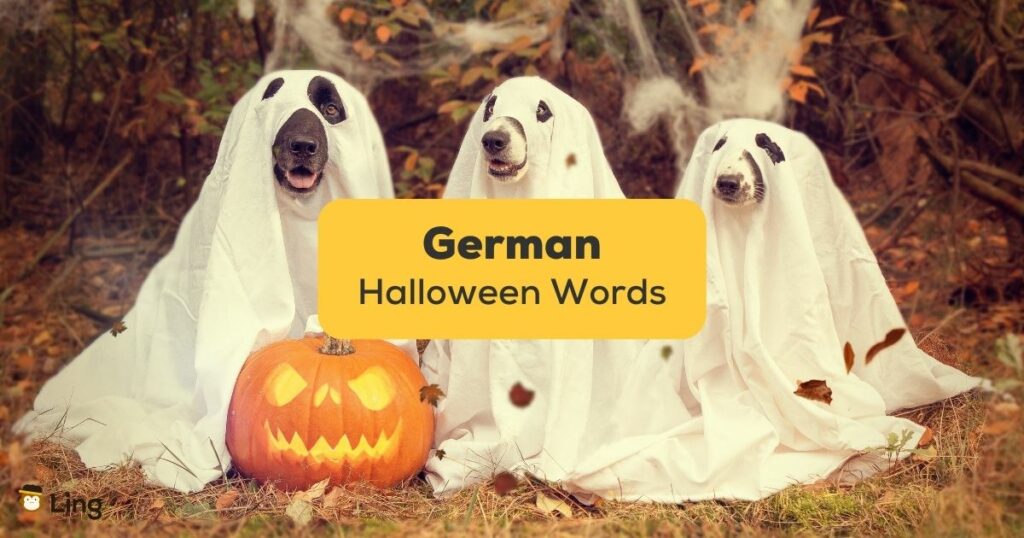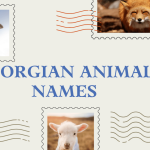As you walk through the cobweb-covered streets and pass by glowing Jack-o’-lanterns, I bet that many of you will be wondering about the common German Halloween words. And honestly, I cannot blame you! It’s just that time of the year when ghosts, ghouls, and all things eerie suddenly excite us! And if you happen to be in Germany during this time of the year, then you’re in luck because the younger generation actually celebrates it. So if you’re gearing up to join some spooky feasts in your craziest Verkleidung (costume), this post is for you. Let’s begin!
Isn’t it fascinating how different cultures celebrate the same holiday in their unique ways? As someone who’s been traveling around, one of the holidays that I’ve always been looking forward to joining is the Halloween party. And no, it’s not just the idea of downing Süßigkeiten (candies) that thrills me but also the fact that I get to practice my skills in a specific language. So when I had the chance to join the celebration in Germany, I took it as an opportunity to belt out those devilishly good words and expressions.
And since you landed on this post, I bet that you also want to do the same! So without further ado, let’s dive right into the German Halloween vocabulary.
Halloween In Germany
In Germany, Halloween isn’t as widely celebrated as in the US, but it’s becoming increasingly popular among the young. The celebration has been influenced heavily by American pop culture, but the Germans also have their unique traditions. Let’s go over some of them in this section.
The Burg Frankenstein Halloween Party
According to the locals, one of the top things they look forward to is celebrating this special day at the legendary Frankenstein Castle located at Mühltal. Every year, a grand Halloween party is held here, attracting thousands of visitors from all corners of the country. The castle, steeped in history and mystery, provides the perfect backdrop for a night of fright. Actors dressed up in terrifying costumes and carefully designed scenes played out across the castle grounds add to the spooky atmosphere, creating an unforgettable Halloween experience.
If you’re joining this scary good event, then here are some words to help you out:
| English | German |
|---|---|
| The Castle | das Schloss |
| The Party | die Feier |
| The Costume | das Kostüm |
| The Scare | der Schreck |
The Tradition Of Rübengeistern
Rübengeistern, or turnip ghosting, is an old German tradition that pre-dates the use of pumpkins as Jack-o’-lanterns. Long before pumpkins became the face of Halloween, Germans would carve scary faces into turnips and place a candle inside to scare away evil spirits. This tradition is still practiced in some parts of Germany, a nod to the country’s historical past.
| English | German |
|---|---|
| The Turnip | die Rübe |
| The Tradition | die Tradition |
| The Candle | die Kerze |
| The Carving | das Schnitzen |
Martinstag Celebration
In Germany, Halloween often gets intertwined with ‘Martinstag’ or St. Martin’s Day, which is celebrated on November 11th. St. Martin’s Day is a time to remember Martin of Tours, a generous man who cut his cloak in half to share with a beggar during a snowstorm. It is common to see children parading on the streets with lanterns, singing songs about St. Martin around the time of Halloween.
| English | German |
|---|---|
| The Lantern | die Laterne |
| The Parade | der Umzug |
| The Song | das Lied |
| St. Martin | Sankt Martin |
Walpurgisnacht Celebration
Walpurgisnacht, also known as Witches’ Night, is a holiday that is celebrated in Germany every year on the night of April 30th to May 1st. This traditional German celebration shares many similarities with Halloween and, in many ways, has influenced the way Halloween is celebrated in the country.
The festival’s origins are steeped in ancient Germanic folklore. It is believed that on Walpurgisnacht, witches gather on the Brocken, the highest peak in the Harz Mountains, to celebrate the coming of spring and perform rituals. People believed that on this night, the spirit realm was particularly close to the earthly realm, similar to the beliefs surrounding Halloween.
| English | German |
|---|---|
| The Witch | die Hexe |
| The Bonfire | das Lagerfeuer |
| The Mountain | der Berg |
| The Spring | der Frühling |
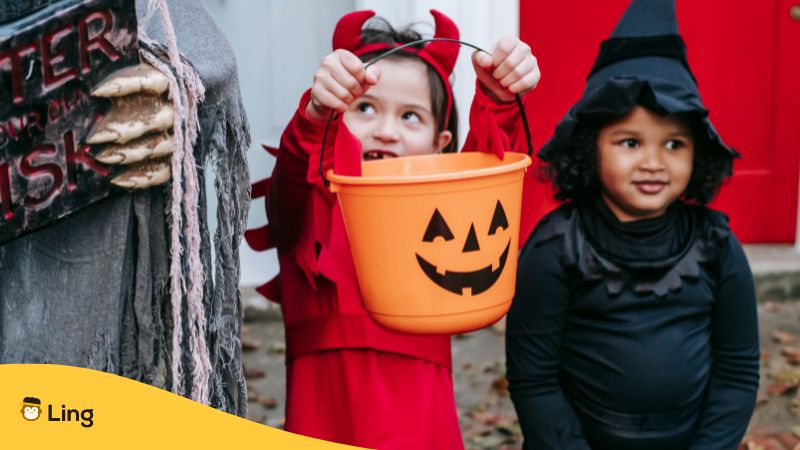
Essential German Halloween Words
If you’re planning to celebrate Halloween in Germany or are just interested in learning more about this tradition from a German perspective, mastering some essential Halloween vocabulary in German can significantly enhance your experience. Below, we rounded up the top words that can help you communicate, understand, and even enjoy the spooky spirit of the holiday in a more authentic way.
| English | German |
|---|---|
| Halloween Night | die Halloween-Nacht |
| Scary | gruselig |
| Mystery | das Geheimnis |
| Creepy | unheimlich |
| Fear | die Angst |
| Magic | die Magie |
| Dark | dunkel |
| Moon | der Mond |
| Shadow | der Schatten |
| Terror | der Terror |
| Nightmare | der Albtraum |
| Eerie | unheimlich |
| Graveyard | der Friedhof |
| Spell | der Zauber |
| Curse | der Fluch |
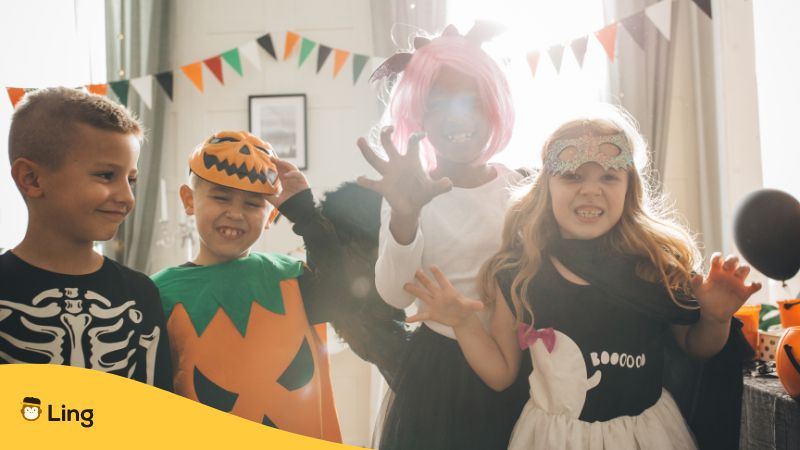
German Halloween Party Costumes
Let’s face it! Halloween is a time for dressing up! It’s an opportunity to transform into someone—or something—different for a night, to step out of the ordinary and embrace the extraordinary. And while the choice of costume can be as varied as the individual, some common themes often emerge.
Whether it’s a scary creature of the night, a well-known character from folklore, or simply something humorous or outlandish, the variety of Halloween costumes you might see at a German party is vast. Below is a table featuring some of the more popular choices for Halloween costumes in Germany, translated from English to German.
| English | German |
|---|---|
| The Alien | der Außerirdische |
| The Astronaut | der Astronaut |
| The Clown | der Clown |
| The Devil | der Teufel |
| The Dinosaur | der Dinosaurier |
| The Doctor | der Arzt |
| The Fairy | die Fee |
| The Ghost | das Gespenst |
| The Monster | das Monster |
| The Nurse | die Krankenschwester |
| The Pirate | der Pirat |
| The Princess | die Prinzessin |
| The Robot | der Roboter |
| The Skeleton | das Skelett |
| The Superhero | der Superheld |
| The Vampire | der Vampir |
| The Werewolf | der Werwolf |
| The Witch | die Hexe |
| The Zombie | der Zombie |
Wow, that’s a lot, right? But wait! It’s not enough that you know those words alone. In order to communicate more effectively, then using those in sentences is a must. As a beginner, you can follow this basic pattern: Ich verkleide mich als + German Costume. Here are some example sentences you can use to practice.
- I’m dressing up as a skeleton = Ich verkleide mich als Skelett.
- I’m dressing up as a vampire = Ich verkleide mich als Vampir.
- I’m dressing up as a witch = Ich verkleide mich als Hexe.
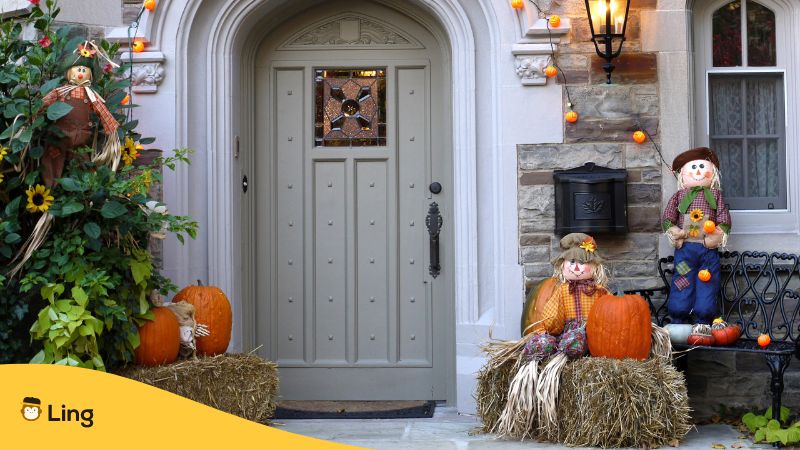
German Halloween Vocabulary For Decorations
As we all know, decorations are a crucial part of any Halloween celebration. In Germany, some homeowners deck out their houses, parties, and even workplaces with an assortment of spooky and festive items, creating an atmosphere befitting this time of the year. You’ll find everything from carved pumpkins (or turnips) and ghastly ghosts to creepy cobwebs and eerie lanterns.
And while the essence of these decorations remain universal, the vocabulary changes from language to language! With that said, let’s explore some common Halloween decorations and their translations from English to German.
| English | German |
|---|---|
| The Bat | die Fledermaus |
| The Black Cat | die schwarze Katze |
| The Candle | die Kerze |
| The Cobweb | das Spinnennetz |
| The Dead | die Toten |
| The Ghost | das Gespenst |
| The Lantern | die Laterne |
| The Pumpkin | der Kürbis |
| The Skull | der Schädel |
| The Spider | die Spinne |
| The Tombstone | der Grabstein |
| The Witch’s Broom | der Hexenbesen |
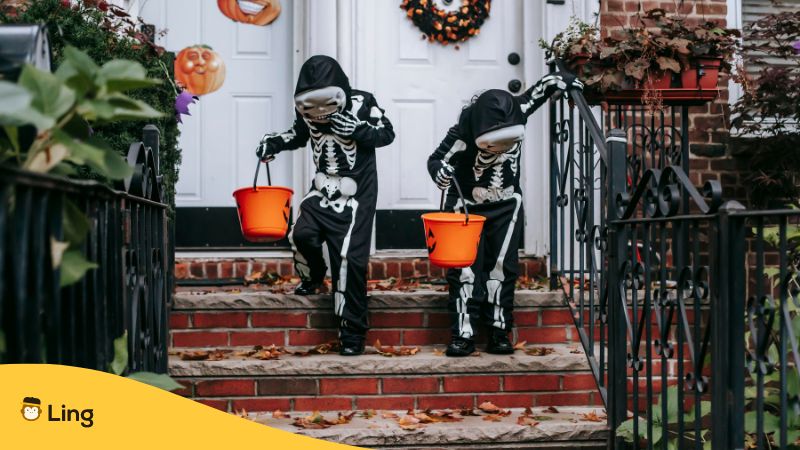
Halloween Activities In German
Just as Halloween celebrations are taking root in German culture, so too are the variety of activities associated with this holiday. From trick-or-treating to carving pumpkins, many of the beloved Halloween traditions have found their place in Germany. Let’s get to know some of them in the table below!
| English | German |
|---|---|
| Trick-or-Treating | auf Süßes oder Saures Jagd gehen |
| Carving Pumpkins | Kürbisse schnitzen |
| Dressing Up | sich verkleiden |
| Attending a Party | an einer Feier teilnehmen |
| Decorating the House | das Haus dekorieren |
| Telling Scary Stories | Gruselgeschichten erzählen |
| Watching Horror Movies | Horrorfilme schauen |
| Making Halloween Treats | Halloween-Leckereien machen |
| Visiting a Haunted House | ein Geisterhaus besuchen |
| Playing Pranks | Streiche spielen |
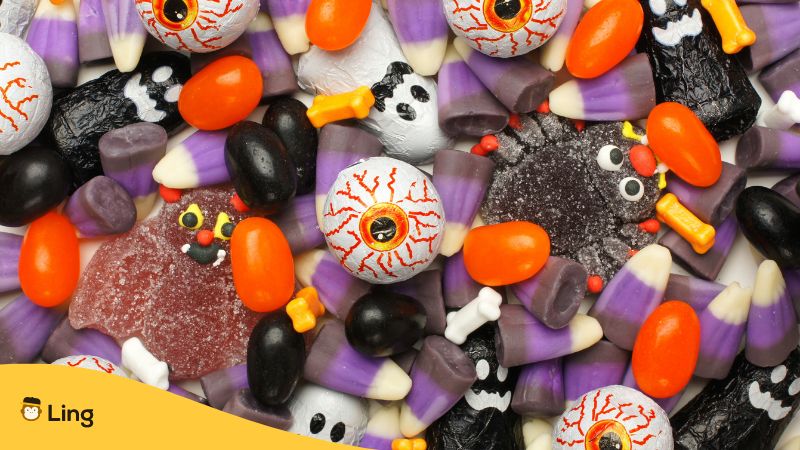
German Halloween Vocabulary For Food
Halloween wouldn’t be complete without its unique assortment of foods and treats. In Germany, many of the traditional Halloween foods we’re familiar with are also popular, and some German classics have also found their way into the mix. Whether you’re bobbing for apples or indulging in some delicious candy, the Halloween food experience is truly one of a kind. Let’s delve into some of the most common Halloween food items and their translations from English to German below!
| English | German |
|---|---|
| The Candy | die Süßigkeiten |
| The Apple | der Apfel |
| The Pumpkin Pie | der Kürbiskuchen |
| The Chocolate | die Schokolade |
| The Popcorn | das Popcorn |
| The Jelly Beans | die Jelly Beans |
| The Caramel Apple | der Karamellapfel |
| The Candy Corn | das Candy Corn |
| The Pretzel | die Brezel |
| The Sausage | die Wurst |
Want To Start Learning German?
If you’re looking to perfect your German greeting of “Frohes Halloween” (Happy Halloween) or dive deeper into the rich treasure trove of German vocabulary, then Ling is the platform for you!
Ling is more than just a language-learning tool—it’s a comprehensive platform tailored to turn learners into confident speakers. With this app, you won’t just memorize words; you’ll put them into action in real-life scenarios! It’s secret? Well, it offers a variety of engaging features to ensure you get the most out of your learning journey. From engaging in simulated conversations with our dedicated chatbot to honing your pronunciation skills with our interactive voice feature, we got your back!
Ready to take your language skills for a test drive? Ling is available for download today on both the App Store and Play Store.
